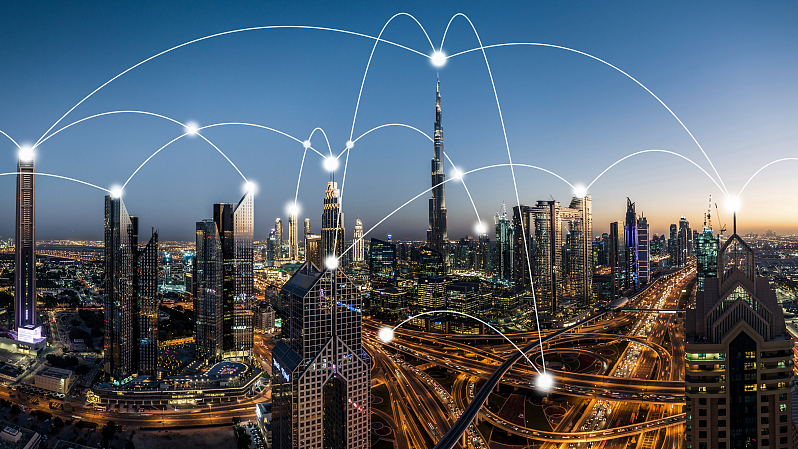
The GCC states, that have good ties with both China and the U.S., have so far been able to balance their positions by slicing up their digital infrastructure between Chinese and CNI-approved U.S. and Western companies. /CFP
The GCC states, that have good ties with both China and the U.S., have so far been able to balance their positions by slicing up their digital infrastructure between Chinese and CNI-approved U.S. and Western companies. /CFP
Editor's note: Abhishek G Bhaya is an International Editor at CGTN Digital. The article reflects the author's opinions, and not necessarily the views of CGTN.
With the 5G ecosystem poised for a massive explosion in the Gulf Cooperation Council (GCC) countries in the coming years, analysts fear the region may get drawn in what is being dubbed the "Digital Cold War" between China and the U.S.
The six GCC states – Saudi Arabia, UAE, Oman, Qatar, Bahrain and Kuwait – have welcomed the participation of Chinese tech firms in the development of their 5G networks and meeting their national digitalization goals despite a vicious U.S. campaign to restrain Chinese entities from expanding their global digital footprint.
However, with the U.S. launching the Clean Network Initiative (CNI) – a digital trade zone that excludes Chinese companies – in August this year, in a clear sign of the escalating Digital Cold War between the two superpowers, Middle East watchers worry the Gulf countries may soon be pushed by Washington to pick a side.
In response to CNI, China a month later introduced its own Global Data Security Initiative (GDSI) calling on all countries to handle data security in a "comprehensive, objective and evidence-based manner" while maintaining the importance of "cyber sovereignty" for each nation.
Announcing the GDSI launch in September, Chinese State Councilor and Foreign Minister Wang Yi, took an apparent swipe at the U.S. without naming it. "Bent on unilateral acts, a certain country keeps making groundless accusations against others in the name of 'clean' network and used security as a pretext to prey on enterprises of other countries who have a competitive edge," he said, adding: "Such blatant acts of bullying must be opposed and rejected."
The GCC states, that have good ties with both China and the U.S., have so far been able to balance their positions by slicing up their digital infrastructure between Chinese and CNI-approved U.S. and Western companies.
"We welcome any nation, or partner that will help us progress to becoming an innovation-based economy… as long as they align with our ambitions, goals and regulatory requirements," Saudi Minister of Communications and Information Technology Abdullah A Alswaha had told this author in an interview last month outlining an approach that resonated with the policy of other GCC countries as well.
The six GCC countries accounted for only 500,000 5G mobile subscribers in 2019. In the next three years by 2023, that number is expected to jump to 21.86 million, or about 21.2 percent of all mobile users in the region, according to a report by Global System for Mobile Communications (GSMA).
Also, by 2025, more than 16 percent of communications data within the GCC states is expected to be transmitted through 5G networks, which is slightly higher than the global average, as per the GSMA report. The region already boasts of a $164 billion annual market for information and communication technology (ICT) products and over the last year, publicly administered cloud services in the GCC countries have soared to reach the valuation of nearly $3 billion.

By 2023, that number of 5G subscribers in six GCC countries is expected to jump to 21.86 million, or about 21.2 percent of all mobile users in the region, according to a report by Global System for Mobile Communications (GSMA). /CFP
By 2023, that number of 5G subscribers in six GCC countries is expected to jump to 21.86 million, or about 21.2 percent of all mobile users in the region, according to a report by Global System for Mobile Communications (GSMA). /CFP
Related stories:
'U.S. targeting of Chinese tech firms a dangerous election-year stunt'
U.S. is behaving like a bully against Chinese tech firms
CGTN Interview: TikTok, Huawei and Trump's tech war on China
As of today, 11 telecom firms from the UAE, Saudi Arabia, Kuwait, Oman and Bahrain have signed contracts with Chinese telecom giant Huawei for their 5G network, while Qatar's main operator has enlisted another Chinese firm, ZTE, for the purpose. Chinese firms are also increasingly participating in the development of 5G-enabled cloud services in the lucrative Gulf market.
Microsoft, IBM, Nokia, NEC, Ericsson and Orange, are some of the leading Western companies involved in building digital infrastructure in the GCC.
The U.S. government is visibly uncomfortable at China's increased presence in the digital infrastructures of, what Washington perceives as, its allies and partners around the globe – including the GCC states. The U.S. has actively campaigned over the past couple of years to hinder the expansion of Huawei and ZTE, especially within the European Union.
The CNI – a political framework intended to secure the U.S. and its partners' digital assets and infrastructures – has been conceived with an aim to contain China's digital outreach. So far, 53 countries and 180 companies have joined the initiative.
Analysts foresee things to get trickier henceforth as Washington sets out to impose the CNI globally.
"As it stands, the CNI will leave GCC states with no option but to pick a side in this unfolding competition between China and the United States. However, doing so will not come as easily for them as for the United States' European allies," Nima Khorrami, a research associate at The Arctic Institute's Center for Circumpolar Security Studies, said in an analytical piece for Carnegie Middle East.
"If GCC states remain outside of the CNI, because of their partnerships with Chinese entities and use of Chinese software and equipment in their 5G networks, they could soon be seen as security risks – if not outright threats – by the U.S. government. Conversely, cutting their commercial ties with Chinese firms and opting for CNI companies in building and maintain 5G infrastructure could jeopardize their burgeoning relations with their largest energy customer," added Khorrami, explaining the predicament the Gulf countries may eventually face.
Advantage China
02:22

Related stories:
China, Saudi Arabia: Partners in shaping innovation-based economies
Connecting the unconnected a top priority for G20, says Saudi minister
CGTN Interview: Will Biden be a friend to China?
China has an advantage over the U.S. in the region as Beijing's Digital Silk Road initiatives are seen as complementary to the Gulf countries' own national developmental priorities. Also, being the world's largest consumer of oil makes China a natural and one of the most significant trading partners of the oil-rich countries. "All of the GCC states – in particular Saudi Arabia and the UAE – have spent considerable financial and human resources to expand their ties with China and lock in its commitment to their sociopolitical stability," Khorrami noted.
"We're very proud of our strategic relationship with China, whether on the technological front or even on the oil and gas front. They are our No. 1 trade partner… and definitely they're helping us leapfrog to becoming an innovation-based economy," the Saudi Minister Alswaha told CGTN in a previous interview, reflecting a sentiment that prevails in other GCC nations as well.
No wonder that the governments of the GCC states are deeply uncomfortable with the escalation of China-U.S. tensions. "The Gulf states are confronting a difficult choice. One option is to prioritize their security, political, and economic partnership with the U.S. — the Gulf's main security guarantor — and thus protect a relationship that is critical in this time of unprecedented tensions with Iran. Their other option is to prioritize their economic dependence on exporting crude to China, which will be crucial to the Gulf's post-pandemic recovery," said Mohammed Soliman, a non-resident scholar with the Middle East Institute's Cyber Program.
The COVID-19 pandemic has made Gulf economies increasingly reliant on China as it recovers from the global recession faster than the U.S. and the EU. "Since COVID-19 restrictions lifted in China, Chinese policymakers have undertaken major steps to develop what they are calling 'industrial internet' of global telecommunications providers at far cheaper prices than their Western competitors in the sector. Saudi Telecom Company (STC) reported a jump of over 1,000 percent in bandwidth due to the surge in remote education," Sophie Zinser, a researcher focusing on China's role in the Middle East, South and Central Asia, wrote in a piece for The Diplomat magazine.
Zinser explained why Chinese companies might have an edge in the region. "The U.S. 5G operations are still lagging behind that of Asia in the Middle East. The Japan Center for Economic Research predicts that given its performance in light of COVID-19, the Chinese economy will surpass that of the United States before 2030. With rollout of 5G in the U.S. lagging in pace behind that of Asia, Huawei and its peer companies' current moves into Middle Eastern markets could chart a course for Asian dominance in the region's future."
Considering the bipartisan support for strong policies against China such as the CNI in the U.S., many analysts see the Gulf region turning into a battleground for tech supremacy as the Digital Cold War further escalates. With GCC states already anxious over U.S. President-elect Joe Biden's readiness to rejoin the Iranian nuclear deal, any pressure by Biden on the Gulf countries to terminate digital ties with China will end up aggravating the tensions in the region.
Only a pragmatic approach by the forthcoming Joe Biden presidency that seeks to avoid branding China as an adversary can possibly save the GCC states from their dilemma of picking a side.
(If you want to contribute and have specific expertise, please contact us at opinions@cgtn.com.)

